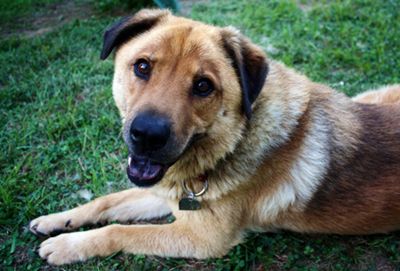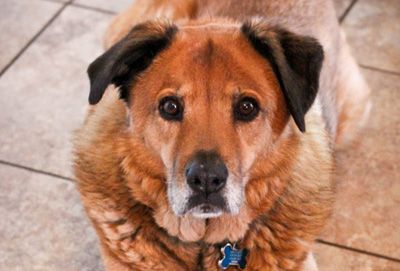Senior vs. geriatric: Semantics or significant?
Why these words aren't interchangeable and what this means for your veterinary patients.

Young Bert (Photos courtesy of Dr. Mary Gardner)

Older Bert
How quickly time passes when you love a pet. Bert was adopted as a puppy from a local shelter and was with his family for 10 years until he developed oral melanoma. His owner, Dr. Dawnetta Woodruff, said Bert was always a quiet dog and loved to lay his head on your lap.
There absolutely is a difference between senior and geriatric pets. It first comes down to a definition, and there isn't a clear cut one for either. The American Veterinary Medical Association doesn't have a concrete definition of senior (just a guideline), and they interchangeably use the words “senior” and “geriatric.” As a veterinarian who exclusively works with advanced aged and terminally ill pets, I did a lot of research in the human terminology between the two for my work as well as the book we just finished (Treatment and Care of the Geriatric Veterinary Patient, available from Wiley in Fall 2017). In human medicine, the term “senior” is really just a definition of a person who has reached a certain age in their lifespan (65 or older). But this doesn't reflect their biology, aging or healthspan. However, “geriatric” is a term used more with their status of health-when a person is extremely fragile.
Classifiers of fragility in people include various combinations of the following indicators:
- Weakness (including grip strength)
- Fatigue or exhaustion
- Weight loss
- Impaired balance
- Decreased physical activity
- Slowed motor performance (gait speed)
- Social withdrawal
- Mild cognitive dysfunction
- Increased vulnerability to physiological stresses
It has been proposed, that to be classified as geriatric, a person should exhibit at least three of the following criteria:
- Weakness
- Weight loss
- Slowed mobility
- Fatigue
I think there are many parallels with our old-aged pets and how we can classify them as geriatric. Regardless of their age (or breed), our geriatric pets are those that are fragile and susceptible to adverse outcomes (e.g. falls, illness) and, therefore, need different care in the home as well as the clinic.
A conversation between a veterinarian and a family about senior care is similar to one that we would have in our 60s with our doctor-prevention, yearly checks, watching diet and exercise. Those are all types of things we as veterinarians cover with our senior patients. But when the geriatric pet feebly walks in, that conversation absolutely needs to change. Learning what struggles the pet is facing on a daily (and nightly) basis, how the family is managing the clinical signs of advanced age, ways to set up the home and car to better care for the pet, etc., are all things to discuss with the family at this time.
I created a geriatric questionnaire for families to fill out that explores some of those hidden signs we see with our geriatric pets. This will help lead the conversation to what is troubling the family and pet most so that they can be addressed. Included on the form is a table with guidelines on life stage based on age and weight.
One could also say that pets in their last 10 percent of their lifespan qualify as geriatric, which would be approximately the following:
• Small-11.5 years old
• Medium-10.2 years old
• Large-8.9 years old
Again, this is strictly “age,” which I think can lead us down a blind path. We have to look at health and fragility as well, but this definitely helps owners know that they are in the range to start looking for those hidden cues. A thorough exam and conversation is needed to really determine the state of the pet and what we can do to help them manage their age-related changes.
Dr. Gardner is a co-founder of Lap of Love Veterinary Hospice, a network of veterinarians around the country whose goal is to empower every owner to care for their geriatric pets.